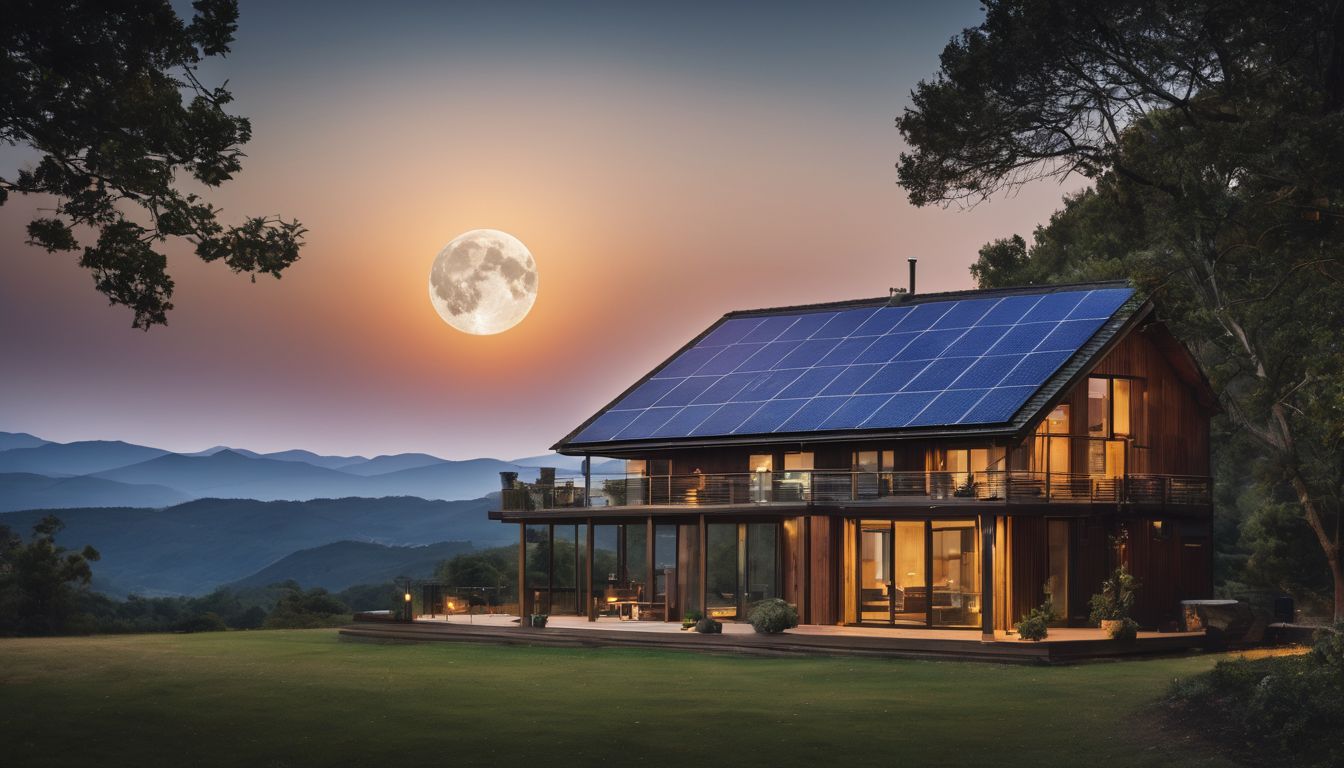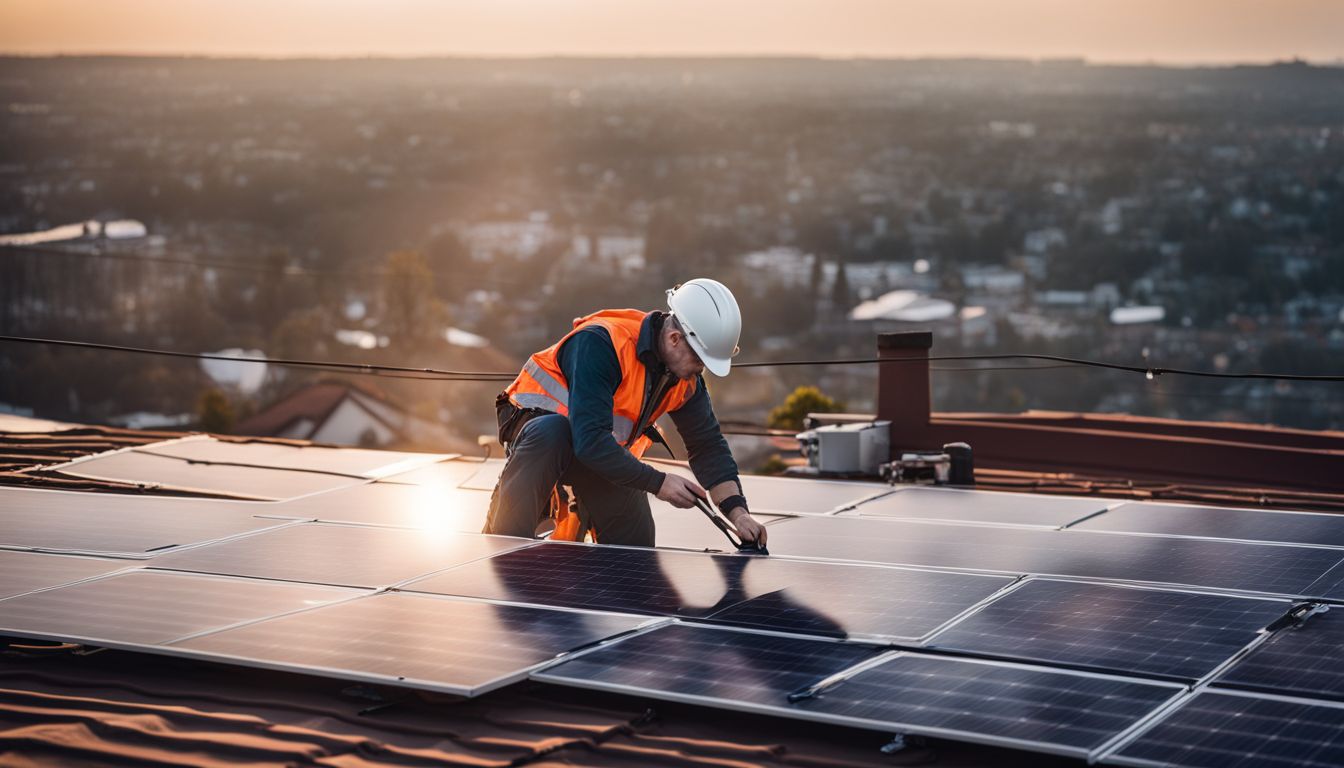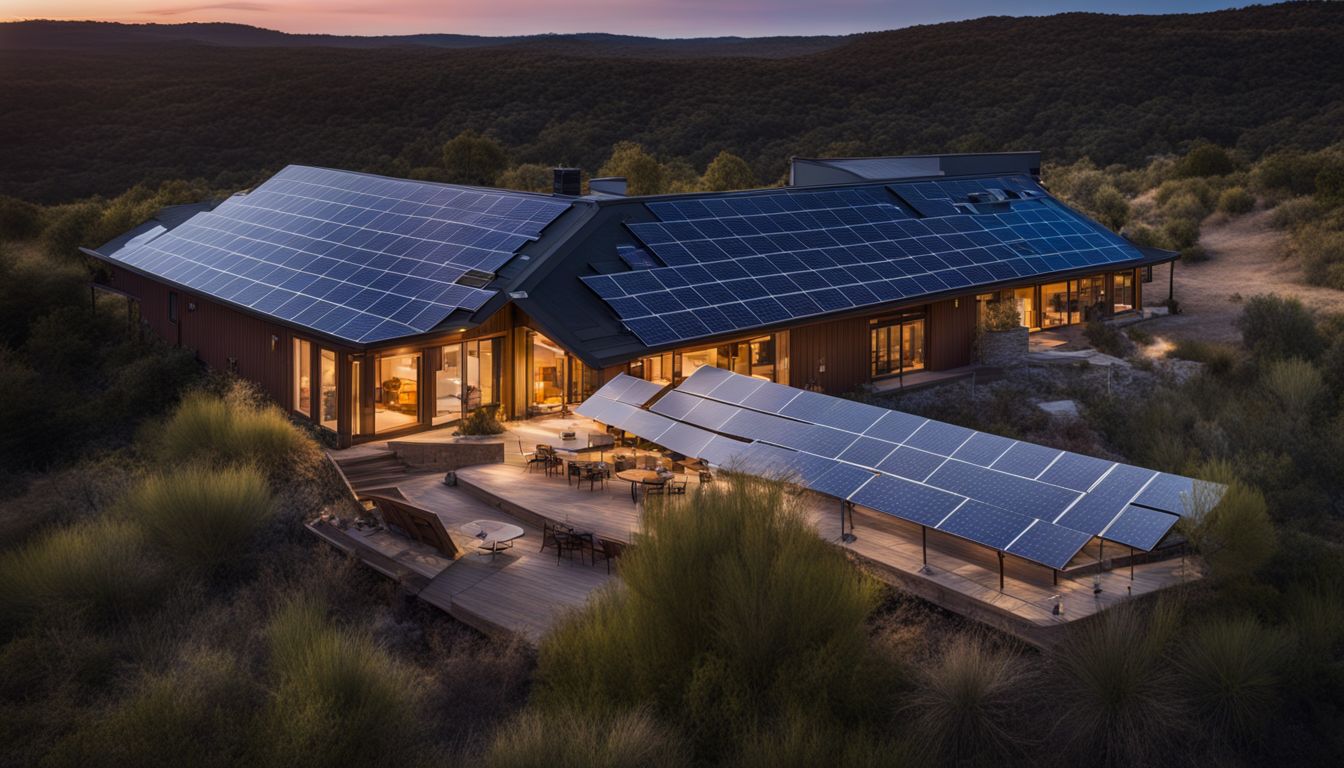Do solar panels work at night?

Many homeowners wonder if their solar panels can capture the moon’s glow to power their homes at night. The reality is that solar panels need sunlight to generate electricity and don't produce energy in the darkness.
This article will guide you through how solar power keeps your lights on when the stars are out, offering smart solutions for continuous energy flow. Keep reading to discover how solar energy doesn't just clock off after sunset.
Key Takeaways
- Solar panels need sunlight to create electricity and can't produce power in the dark.
- People use net metering and batteries to keep their homes powered at night with energy saved from the daytime.
- Scientists are making new tech like 'night solar panels' that might one day work after sunset.
Understanding Solar Panels

Solar panels function by harnessing the energy from sunlight through photovoltaic cells and converting it into usable electricity. The amount of energy produced depends on factors such as the intensity and duration of sunlight exposure.
https://www.youtube.com/watch?v=Yxt72aDjFgY
How do solar panels work?
Solar panels are like magic sheets that catch sunlight and turn it into power for homes and gadgets. They use special cells called photovoltaic (PV) cells to do this trick. These PV cells take in light from the sun and make electrons move around, creating a flow of electricity.
The energy they make is called direct current (DC), but our homes need alternating current (AC). So, there's an inverter that changes DC into AC, so we can use it to watch TV or keep food cold in the fridge.
PV cells are put together in big groups to make a solar panel. When lots of these panels join up on a roof or field, they can create enough power for many houses or even a whole town! This clean energy is really good for the Earth because it doesn't pollute like burning coal or gas does.
And once you have solar panels set up, the sunshine gives you power for free!
The Role of Sunlight in Solar Panels
Sunlight plays a crucial role in how solar panels make electricity. During the day, the sun shoots out tiny packets of energy called photons. When these photons hit solar cells on a panel, they knock electrons loose.
This action starts an electron flow, which creates an electric current.
Solar panels need this light to work. They have special materials inside them called photovoltaic (PV) cells, and these are what turn sunlight into electricity. The brighter the sun shines, the more power gets made because more photons are hitting the PV cells.
That's why solar panels do their best job in sunny places and during bright days!
Do solar panels work at night? A Technical Explanation

Solar panels need light from the sun to make electricity. At night, there is no sunlight, so they can't create power. This doesn't mean your home goes dark after sunset, though! Your house can still get electricity because of energy that was stored during the day or from the power grid.
Scientists are working on special solar panels that might one day work at night. These 'night solar panels' could use a little bit of light from stars and even streetlights to make small amounts of power—enough for maybe charging a phone.
Also, some clever people have thought about using the cool air at night to help make electricity with devices called thermoelectric generators. But right now, regular solar panels rest once it gets dark outside.
https://www.youtube.com/watch?v=jGczgfbS1Yk
Alternatives to Sunlight for Solar Panels
Other sources of light, such as moonlight and artificial indoor lighting, can also contribute to the generation of solar power. 'Night Solar Panels' have been developed to harness this alternative light source for energy production during nighttime hours.
https://www.youtube.com/watch?v=61xcYV4QuGg
Other sources of light
Lights from the street and inside our homes are bright for us, but they don't make much power for solar panels. The moon shines at night, but its light is too weak to help solar panels work.
These sources just can't match the sun's energy.
Still, even without sunlight, there's hope for some light during the dark hours. Scientists have been figuring out how to use what they call 'anti-solar cells.' They make a small amount of electricity from the earth’s heat that goes up into the sky at night.
While it's not a lot yet, this clever idea could one day give us more power after sunset.
'Night Solar Panels' and Their Functioning
Scientists are working on new kinds of solar panels that can make electricity even when it's dark. These "night solar panels" use a cool trick. They catch the Earth's heat that goes up into space at night as infrared light.
This lets them create some power, even without sunlight.
Night solar panels are different from normal ones because they focus on a temperature difference. They take in the warmth from the air and turn it into electricity thanks to something called 'thermoelectric generation'.
This is exciting for places where it gets really cold or dark a lot, like in northern countries or during the winter months. It means they could get energy all day and night!
How Solar Power Works at Night
Solar power at night is made possible through net metering and battery storage. Net metering allows excess energy generated during the day to be fed back into the grid, while battery storage systems store that energy for use when sunlight is not available.
This ensures a continuous and reliable power supply, even after sunset.
Net Metering
Net-metering is a smart way for people with solar panels to make the most of their power. Think of it like rollover minutes on a phone plan. When your panels soak up more sunshine than your home can use, you send this extra electricity to the local grid.
This gives you credit with the electric company, almost like putting money in a bank.
Then, at night or when it's cloudy and your panels aren't catching much sun, you use those credits to pull energy from the grid. It means that even when there's no sun, you still get electricity without paying more.
This system helps balance out your energy use and keep costs down across days and nights, sunny or not so sunny times.
Battery Storage
Solar batteries shine when the sun doesn't. They keep hold of the energy made by solar panels during the day. Then, at night or on cloudy days, they give back this power to use in your home.
It's like having a savings account for sunlight!
Companies that make solar panels love these batteries because they can save lots of energy and keep it for a long time. Plus, they're really good at giving out most of the energy they store without getting worn down.
This means you can count on them to power your lights and gadgets even when the stars are out instead of the sun.
Should you leave your solar panels on all the time?
Leaving your solar panels on all the time is not necessary, as they do not work at night. They need sunlight to produce electricity, and keeping them on during the night won't be productive.
It's more efficient to have them operational during daylight hours when they can harness sunlight for power generation.
If you leave your solar panels on throughout the night, it won't result in any power production since they rely on sunlight. Therefore, it's best to optimise their usage by aligning them with daylight hours rather than constantly leaving them on.
By incorporating a timer or automation system for your solar panels, you can ensure that they are activated when there's sufficient sunlight available to generate electricity effectively without wasting energy during the night when no power can be harnessed.
Conclusion
In conclusion, solar panels do not work at night since they need sunlight to generate electricity. However, during the day when the sun is out, they can produce extra power. While there are no solar panels designed specifically for nighttime use, technologies like thermoelectric generators can harness temperature differences after sunset for power generation.
It's important to understand that while solar panels are an excellent source of clean energy during daylight hours, alternative or backup energy sources may be necessary for nighttime power needs.
For more in-depth insights, feel free to read our detailed guide on whether you should leave your solar panels on all the time.
FAQs
1. Can solar panels make electricity at night?
Solar panels themselves can't generate electricity in the dark, but they work with systems like a solar battery to provide stored energy, keeping your lights on even after sunset.
2. What's the deal with solar power when there's no sun?
While direct sunlight is key for electricity production during the day, innovations like the Tesla Powerwall let you use solar energy storage for power outages or nighttime needs by saving extra energy made in daylight.
3. Do all solar setups give me power after dark?
Not every setup has this feature; however, if your rooftop solar comes with an energy storage system or backup power plan connected to the utility grid, you'll still have electricity after daylight hours.
4. How does storing sunlight as energy work exactly?
Your photovoltaic (PV) system captures the sun’s rays and converts them into electricity. When paired with a device like a smart thermostat or a home battery, it can save that surplus generated power for later use.
5. Is it true that special technology might allow future panels to create some power at night?
Researchers from places such as Stanford University are studying ways to design panels that could harvest infrared radiation and waste heat at night—though these concepts are still in experimental stages!
6. Does going off-grid mean I won't have any electric supply at night without sunlight?
Choosing an off-grid life means relying on renewable sources like your own solar panel array—combine that with batteries designed for storing energy efficiently, and you're all set whenever there's no light.











